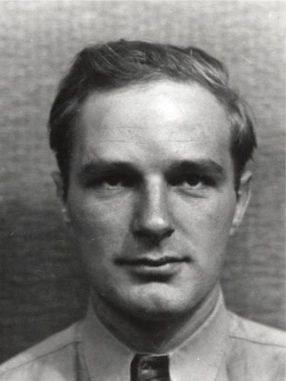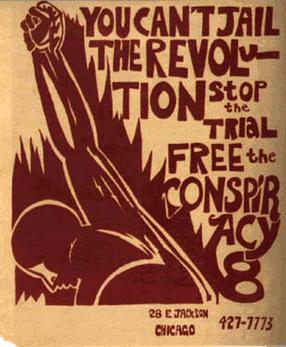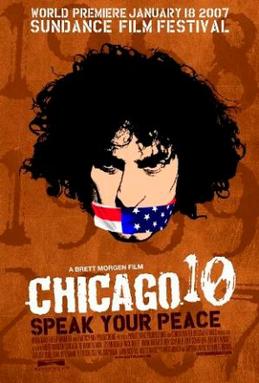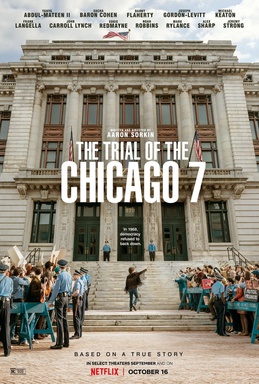
Abbot Howard Hoffman was an American political and social activist who co-founded the Youth International Party ("Yippies") and was a member of the Chicago Seven. He was also a leading proponent of the Flower Power movement.

Robert George Seale is an American political activist and author. Seale is widely known for co-founding the Black Panther Party with fellow activist Huey P. Newton. Founded as the "Black Panther Party for Self-Defense", the Party's main practice was monitoring police activities and challenging police brutality in Black communities, first in Oakland, California, and later in cities throughout the United States.

Jerry Clyde Rubin was an American social activist, anti-war leader, and counterculture icon during the 1960s and early 1970s. Despite being known for holding radical views when he was a political activist, he ceased holding his more extreme views at some point in the 1970s and instead opted for a successful career as a businessman. In the 1960s, during his political activism heyday, he was known for being one of the co-founders of the Youth International Party (YIP) whose members were referred to as Yippies, and standing trial in the Chicago Seven case.
Julius Jennings Hoffman was an American attorney and jurist who served as a United States district judge of the United States District Court for the Northern District of Illinois. He presided over the Chicago Seven trial.

William Moses Kunstler was an American attorney and civil rights activist, known for defending the Chicago Seven. Kunstler was an active member of the National Lawyers Guild, a board member of the American Civil Liberties Union (ACLU) and the co-founder of the Center for Constitutional Rights (CCR), the "leading gathering place for radical lawyers in the country."

David T. Dellinger was an American pacifist and an activist for nonviolent social change. Although active beginning in the early 1940s, Dellinger reached peak prominence as one of the Chicago Seven, who were put on trial in 1969.

The Chicago Seven, originally the Chicago Eight and also known as the Conspiracy Eight or Conspiracy Seven, were seven defendants – Rennie Davis, David Dellinger, John Froines, Tom Hayden, Abbie Hoffman, Jerry Rubin, and Lee Weiner – charged by the United States Department of Justice with conspiracy, crossing state lines with intent to incite a riot, and other charges related to anti-Vietnam War and 1960s counterculture protests in Chicago, Illinois during the 1968 Democratic National Convention. The Chicago Eight became the Chicago Seven after the case against codefendant Bobby Seale was declared a mistrial.

Carl Winston Lumbly is an American actor. He is known for his role as television's first Black superhero M.A.N.T.I.S., Dick Hallorann in Doctor Sleep, NYPD detective Marcus Petrie on the CBS police drama Cagney & Lacey, CIA agent Marcus Dixon on the ABC espionage drama series Alias, and as the voice of J'onn J'onnz / Martian Manhunter in the animated series Justice League,Static Shock and Justice League Unlimited, all part of the DC Animated Universe. As a reference to his voice work as J'onn, Lumbly portrayed J'onn J'onnz's father, M'yrnn, on The CW's Arrowverse on Supergirl from 2017 until 2019. He also plays Isaiah Bradley, the first Black super-soldier in the Marvel Cinematic Universe (MCU) installments The Falcon and the Winter Soldier (2021) and the forthcoming Captain America: Brave New World (2024).

Elliott Gould is an American actor. In a career spanning over seven decades, he began acting in Hollywood films during the 1960s.

Rennard Cordon Davis was an American anti-war activist who gained prominence in the 1960s. He was one of the Chicago Seven defendants charged for anti-war demonstrations and large-scale protests at the 1968 Democratic National Convention in Chicago. He had a prominent organizational role in the American anti–Vietnam War protest movement of the 1960s.
Thomas Aquinas Foran was a United States Attorney best known as the chief prosecutor in the Chicago Seven conspiracy trial in which seven defendants, including Jerry Rubin, Abbie Hoffman, David Dellinger, Rennie Davis, and Tom Hayden, were charged with inciting riots at the 1968 Democratic National Convention. Foran also prosecuted several police officers caught on film beating the protestors with clubs.

Steal This Movie! is a 2000 American biographical film directed by Robert Greenwald and written by Bruce Graham, based on the 1976 book To America with Love: Letters From the Underground by Anita and Abbie Hoffman and 1992 book Abbie Hoffman: American Rebel by Marty Jezer. The film follows 1960s radical figure Abbie Hoffman, and stars Vincent D'Onofrio and Janeane Garofalo, with Jeanne Tripplehorn and Kevin Pollak.
John Radford Froines was an American chemist and anti-war activist, noted as a member of the Chicago Seven, a group charged with involvement with the riots at the 1968 Democratic National Convention in Chicago. Froines, who held a Ph.D. in chemistry from Yale, was charged with interstate travel for purposes of inciting a riot and with making incendiary devices, but was acquitted. He later served as the Director of Toxic Substances at the federal Occupational Safety and Health Administration and then director of UCLA’s Occupational Health Center. He also served as chair of the California Scientific Review Panel on Toxic Air Contaminants for nearly 30 years before resigning in 2013 amid controversy and claims of conflict of interest.

Leonard Irving Weinglass was a U.S. criminal defense lawyer and constitutional law advocate, best known for his defense of participants in the 1960s counterculture. He was admitted to the bar in New Jersey, New York, Connecticut and California. He taught criminal trial advocacy at the University of Southern California Law School from 1974 to 1976, and at the Peoples College of Law, in Los Angeles, California from 1974 to 1975.
Jeremy Paul Kagan is an American film and television director, screenwriter, and television producer.
Pigasus, also known as Pigasus the Immortal and Pigasus J. Pig, was a 145-pound (66 kg) domestic pig that was nominated for President of the United States as a theatrical gesture by the Youth International Party on August 23, 1968, just before the opening of the Democratic National Convention in Chicago, Illinois. The youth-oriented party was an anti-establishment and countercultural revolutionary group whose views were inspired by the free speech and anti-war movements of the 1960s, mainly the opposition to United States involvement in the Vietnam War.

Lee Weiner is an author and member of the Chicago Seven who was charged with "conspiring to use interstate commerce with intent to incite a riot" and "teaching demonstrators how to construct incendiary devices that would be used in civil disturbances" at the 1968 Democratic National Convention. He was acquitted of all charges by the jury and convicted on seven charges of criminal contempt that were later overturned on appeal. In 2020, Weiner published a memoir, Conspiracy to Riot: The Life and Times of One of the Chicago 7.

Chicago 10: Speak Your Peace is a 2007 American animated documentary written and directed by Brett Morgen that tells the story of the Chicago Eight. The Chicago Eight were charged by the United States federal government with conspiracy, crossing state lines with intent to incite a riot, and other charges related to anti-Vietnam War and countercultural protests in Chicago, Illinois during the 1968 Democratic National Convention.

The 1968 Democratic National Convention protests were a series of protests against the United States' involvement in the Vietnam War that took place prior to and during the 1968 Democratic National Convention in Chicago, Illinois. The protests lasted approximately seven days, from August 23 to August 29, 1968.

The Trial of the Chicago 7 is a 2020 American historical legal drama film written and directed by Aaron Sorkin. The film follows the Chicago Seven, a group of anti–Vietnam War protesters charged with conspiracy and crossing state lines with the intention of inciting riots at the 1968 Democratic National Convention in Chicago. It features an ensemble cast including Yahya Abdul-Mateen II, Sacha Baron Cohen, Daniel Flaherty, Joseph Gordon-Levitt, Michael Keaton, Frank Langella, John Carroll Lynch, Eddie Redmayne, Noah Robbins, Mark Rylance, Alex Sharp, Ben Shenkman, and Jeremy Strong.















